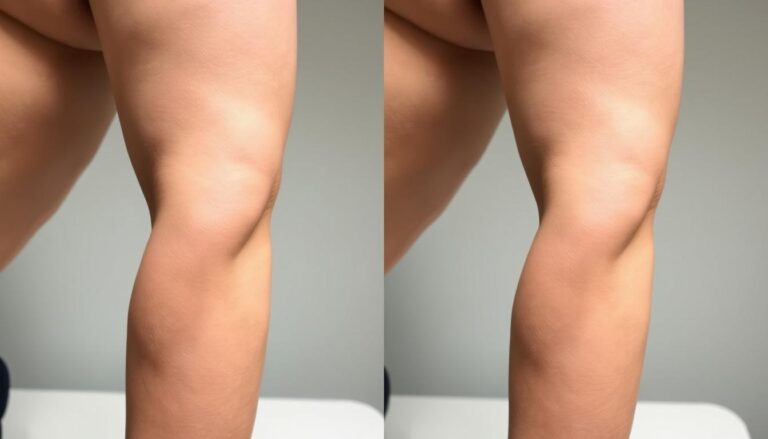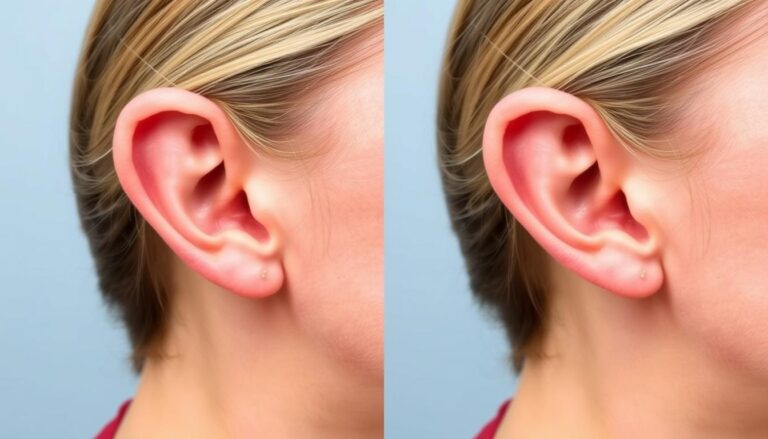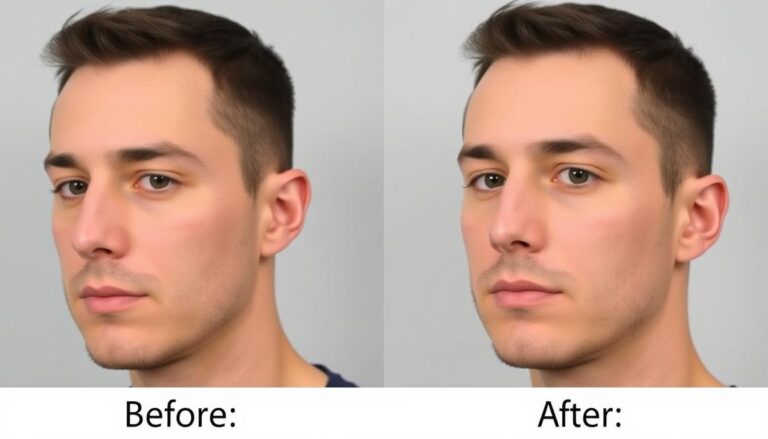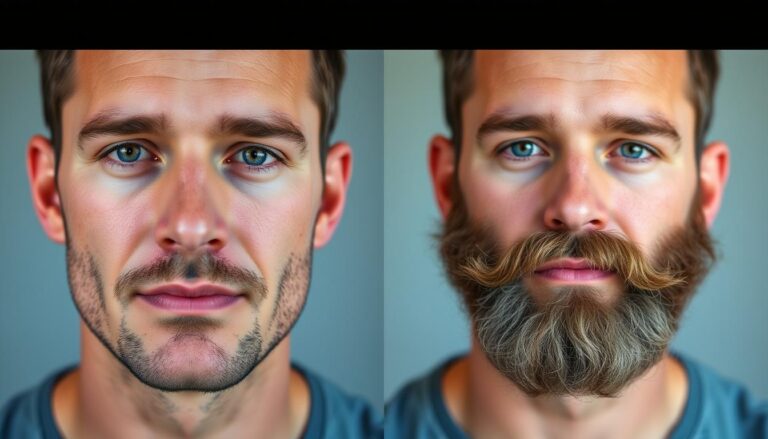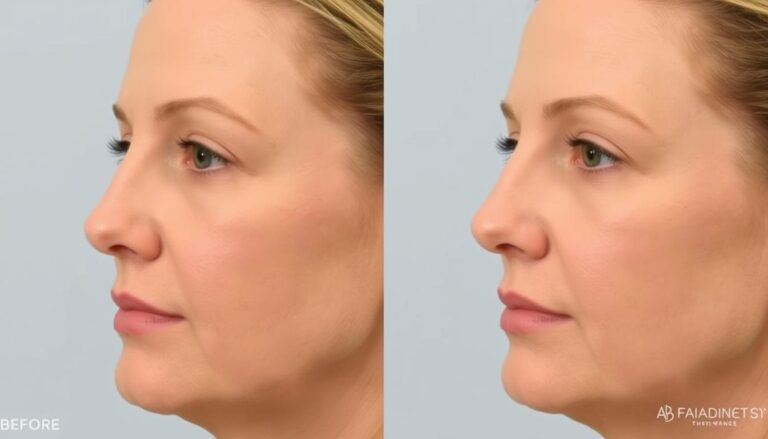Jaw Surgery Before and After: Stunning Transformations
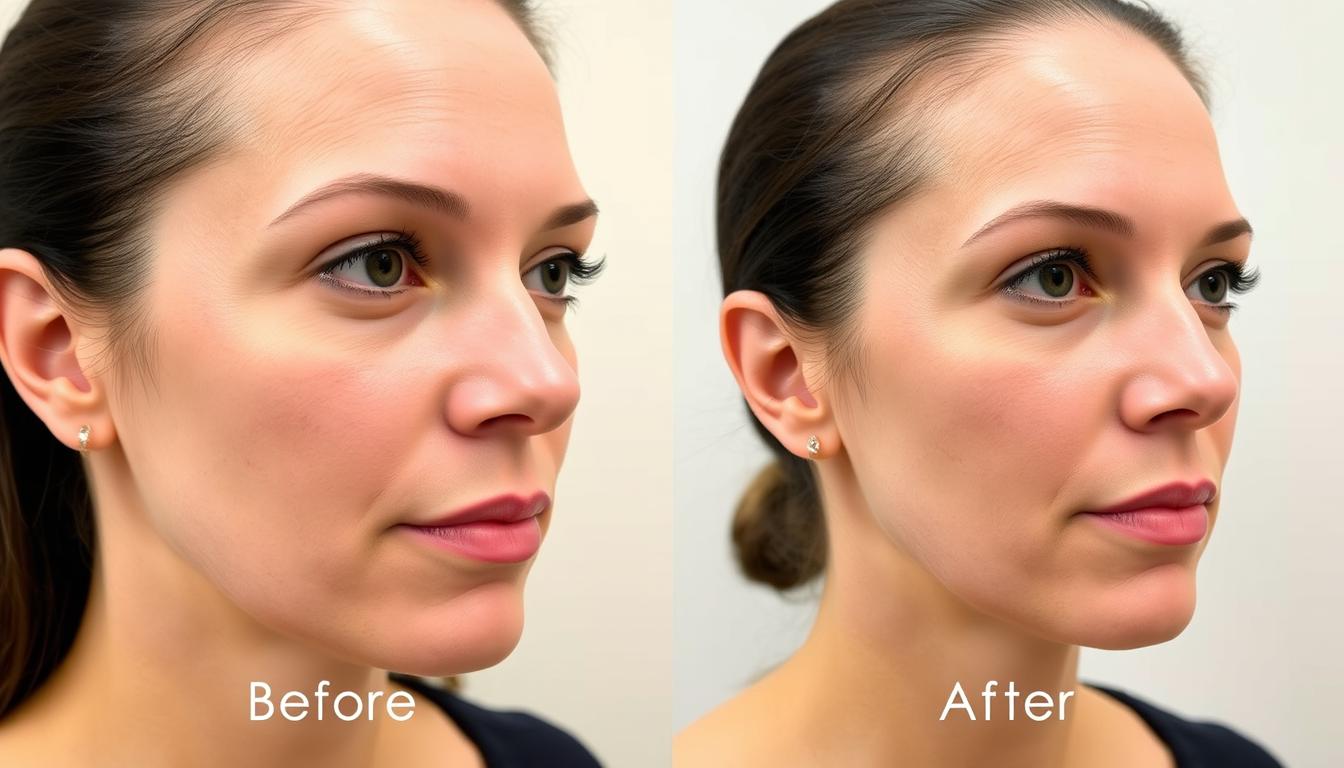
Did you know about 1 in 3 patients with cleft lip and palate get jaw surgery? This shows how much jaw surgery can change lives. It’s a surgery that makes jaws work better and look different.
Jaw surgery is for many dental and facial issues. It’s not just about looks; it’s about how well you can eat and speak. We’ll look at the whole jaw surgery process, from planning to recovery. You’ll see amazing changes in people’s jaws and hear their stories.
Table of Contents
What is Jaw Surgery?
Jaw surgery, also known as orthognathic surgery, fixes jaw and teeth problems. It makes the jaw work better and look better too. People get jaw surgery to look more balanced and to fix issues like underbites and overbites.
Overview of the Treatment
This surgery is complex and needs careful planning. It often starts with orthodontic work to align teeth. It boosts confidence and makes faces look better. It also helps with breathing and sleep problems.
Types of Jaw Surgery
There are different jaw surgeries for different needs. Here are a few:
- Genioplasty – reshapes the chin for balance
- Le Fort Osteotomy – works on the upper jaw
- Bilateral Sagittal Split Osteotomy (BSSO) – fixes the lower jaw
These surgeries can be combined with other treatments like facial implants. Modern methods make treatment faster and more effective. Top surgeons have done thousands of successful surgeries.
If you want to improve your situation, learning about jaw surgery is key. Talking to doctors about it can help you make informed choices.
Who Needs Jaw Surgery?
Figuring out if you need jaw surgery involves spotting common jaw issues. It also looks at your health and how well your jaw works. Many conditions make people candidates for jaw surgery. These issues can really affect your life and daily tasks.
Common Conditions Requiring Surgery
Many dental and skeletal problems might need surgery. These include:
- Malocclusion (improper bite alignment)
- Temporomandibular joint (TMJ) disorders
- Obstructive sleep apnea caused by jaw misalignment
- Severe teeth misalignments
- Facial asymmetries that affect aesthetics and functionality
- Cleft lip and cleft palate leading to bite and alignment problems
Signs You May Need Treatment
Look out for signs for surgery. These might be:
- Chronic jaw pain or discomfort
- Difficulty chewing or speaking
- Unusual wear on teeth due to misalignment
- Numbness in the jaw or lips after injuries
- Inability to comfortably close the mouth
- Persistent headaches linked to jaw tension
The Procedure for Jaw Surgery
Jaw surgery is a detailed process aimed at improving jaw function and appearance. It can take two to six hours, depending on the case. Understanding the steps can help ease worries and provide clarity.
Anesthesia options and pain management are key parts of the experience. They ensure comfort and safety during and after surgery.
Step-by-Step Process
The journey starts with careful planning. Before surgery, patients often get orthodontic treatment to align their teeth. This step is crucial for a successful surgery.
On the day of the surgery, patients are admitted and given general anesthesia. This makes them comfortable and safe. The surgeon then makes incisions inside the mouth to avoid scars.
The surgeon moves the jawbones to the right position. This ensures the face looks balanced. Sometimes, devices like bone distractors are used to help new bone grow. This detailed process aims for lasting results.
Anesthesia and Pain Management
General anesthesia is used during jaw surgery to keep patients comfortable. After surgery, managing pain is key to a smooth recovery. Patients are given medication to help with any discomfort.
They are advised to eat soft foods for up to six weeks. This helps the jawbones heal properly.
Working with orthodontists is important for success. The team checks on the patient’s progress and makes any necessary changes. Recovery can take months, but regular check-ups are crucial.
Patients often see big improvements in their daily life and confidence after recovery. For those looking for extra help, orthopedic therapy can aid in recovery and mobility.
Pre-Treatment Care for Jaw Surgery
Getting ready for jaw surgery is key to a good outcome. A detailed pre-surgery consultation is vital. It makes sure all important steps are taken and any needed tests are done.
This stage is about understanding what you need. It helps create surgery plans just for you. Knowing what to expect, like imaging and orthodontic checks, prepares you for the big day.
Consultation and Evaluation
Your pre-surgery meeting is very important. Surgeons check your condition and talk about your treatment. They also plan a plan just for you.
Tests like imaging studies help them see what needs to be done. It’s also a time to talk about any possible problems. Finding the right therapist can help with the emotional side of surgery.
Preparing for the Surgery Day
On the day of surgery, following instructions is crucial. You’ll need to know about food and drink rules. Drinking lots of water is often advised.
Medicine for pain and nausea is given to keep you comfortable. Knowing when to start soft foods or mouth rinses is important. It helps you recover smoothly.
Before and After Treatment Pictures
Showcasing jaw surgery before and after pictures gives a clear view of the big changes patients go through. These images show not just how good they look but also how much better they can function. Many people have shared their stories, showing how this surgery changed their self-esteem and life quality.
Inspiring Transformations
Every patient’s story is different, but the results are often amazing. For instance, in Case #3347, a patient with a severely receded lower jaw saw a huge improvement after surgery. Another case, #3354, focused on sleep apnea, showing big changes in the upper and lower jaws to help breathing.
Real Patient Experiences
Patients often say they feel new and more confident after surgery. Their before and after pictures inspire others thinking about the surgery. In Case #3351, the surgery not only made the face look better but also fixed the teeth alignment. These stories help others understand what jaw surgery can do.
Post-Treatment Care After Jaw Surgery
Good care after jaw surgery is key for a smooth recovery. The time it takes to heal varies, based on the surgery and the person. Knowing what to expect helps both patients and their loved ones.
Recovery Timeline
Patients usually stay in the hospital for 1 to 2 days after surgery. Swelling starts right away and can last about a week. After that, most people start to feel better slowly.
They should eat only liquids for the first 6 weeks, especially if their jaw is wired shut. By the second week, they can start eating soft foods. Eating lots of calories and protein helps in the first 1 to 2 months. Swelling goes down over weeks, and facial sensitivity fades over months.
Tips for Managing Discomfort
Managing pain is very important after surgery. Patients often use pain meds and ice to reduce swelling and pain. They should also rinse their mouth with warm salt water 3 to 4 times a day to help healing and prevent infection.
Doing jaw exercises as directed by their doctor is also important. For more tips on managing pain, patients can look at resources like healing progress monitoring. Keeping an eye on symptoms and following advice helps recovery go well.
Common Risks of Jaw Surgery
It’s crucial to know about jaw surgery risks before you decide to get it done. The surgery is usually safe with a skilled surgeon. But, there are risks that need to be watched out for.
Surgical Risks Explained
There are several possible problems that can happen during or after jaw surgery. These include:
- Blood loss
- Infection
- Nerve injury
- Jaw fracture
- Relapse of the jaw to its original position
- Problems with bite fit and jaw joint pain
- Need for further surgery
- Root canal therapy on selected teeth
- Loss of a portion of the jaw
After surgery, you might feel pain and swelling. Eating can be tough, but supplements or a dietitian can help.
Long-Term Implications
There are also long-term effects to consider. These can include changes in how your teeth fit together and jaw pain. Some might need more surgeries to fix things.
Others might face ongoing speech or alignment issues. This shows why talking to your surgeon is so important before surgery.
Products to Use Before and After Treatment
Using the right products is key for jaw surgery recovery. Good oral care and recovery supplements help a lot. They make healing smoother, reduce pain, and prevent infections.
Recommended Oral Care Products
Good oral hygiene is crucial after surgery. Here are some products that can help:
- Soft-bristle toothbrushes are gentle on gums and the surgical area.
- Mouth rinses made for post-op care clean your mouth and lower infection risk.
- Vaseline keeps lips moist, especially in the first 10 days after surgery.
- Using humidifiers near your bed can soothe your nose, especially after upper jaw surgery.
Supplements for Recovery
Some supplements also aid in recovery:
- Protein supplements help fix tissues, especially since you might lose weight during recovery.
- Anti-inflammatory supplements can lessen swelling and pain, making recovery better.
- Drinking at least 1½ liters of fluid a day is important for recovery.
These products and supplements are crucial for jaw surgery recovery. Using them right can make your recovery smoother.
| Category | Product | Purpose |
|---|---|---|
| Oral Care | Soft-bristle Toothbrush | Prevents irritation during brushing |
| Oral Care | Mouth Rinse | Helps maintain oral hygiene and fights infection |
| Recovery Supplements | Protein Powder | Aids tissue repair and recovery |
| Recovery Supplements | Anti-inflammatory Supplements | Reduces swelling and discomfort |
| Skin Care | Vaseline | Keeps lips moisturized |
Alternative Treatments to Jaw Surgery
Looking for options other than jaw surgery? There are promising alternatives. These methods can fix dental and orthodontic problems with less pain and quicker recovery. They also improve your oral health a lot.
Non-Invasive Options Available
Many non-invasive treatments are now being used as jaw surgery alternatives. Face Lift Dentistry® is one such method. It corrects misalignments and improves looks and function without surgery. The benefits include:
- Open bite treatment in just one month, avoiding double jaw surgery.
- Face Lift Dentistry® reverses aging effects without overbite surgery.
- Non-surgical methods fix underbites by moving the lower jaw in three dimensions.
- No drilling on healthy teeth, making it a more gentle treatment.
- Relief from pain from recessive chins and overbites without surgery.
Comparison with Surgical Solutions
Looking at treatment options, surgical and non-invasive methods differ. Jaw surgery fixes big misalignments but comes with risks like long recovery and diet changes. Non-invasive treatments like Face Lift Dentistry® offer:
| Feature | Surgical Solutions | Non-Invasive Treatments |
|---|---|---|
| Treatment Duration | Several months | Approximately one month |
| Recovery Time | Long, may involve swelling and pain | Minimal, quicker healing |
| Risk of Complications | Higher (nerve damage, anesthesia reactions) | Lower, fewer adverse effects |
| Aesthetic Improvement | Direct, often through correction | Indirect, via enhancement of facial structure |
More people are looking for safe and effective ways to fix dental problems. Non-invasive treatments are becoming popular alternatives to jaw surgery. They help with TMJ issues and bite problems, aiming to improve oral health and looks.
How Much Does Jaw Surgery Cost?
Knowing the cost of jaw surgery is key to planning your treatment. The cost can change a lot based on the surgery’s complexity, where it’s done, and the surgeon’s skill. Without insurance, costs can range from $20,000 to $40,000. This includes fees for the surgeon, anesthesia, hospital bills, and care after surgery.
Breakdown of Typical Expenses
Here’s a detailed overview of the surgery expenses associated with jaw surgery:
| Expense Type | Estimated Cost |
|---|---|
| Surgeon Fees | $5,000 – $15,000 |
| Anesthesia | $1,000 – $3,000 |
| Hospital Costs | $4,000 – $10,000 |
| Post-Operative Care | $1,000 – $3,000 |
| Total Estimated Cost | $20,000 – $40,000 |
Insurance Coverage Considerations
Insurance coverage for jaw surgery is important for managing costs. Different health insurance plans may help pay for part or all of the costs for necessary surgeries. It’s best to talk to your insurance company to find out what’s covered and if you need approval first. Knowing if your surgery is for function or looks will affect how much insurance helps.
Finding Jaw Surgery Treatment Near Me
Looking for jaw surgery treatment means doing your homework on local surgeons. Ask friends, family, or doctors for advice. Online reviews can also give you a peek into what others have experienced. Knowing a surgeon’s background, experience, and specialty is key to making a good choice.
Researching Local Surgeons
Finding skilled surgeons nearby involves looking at several things. Here are some points to consider:
- Experience: Seek out surgeons with lots of jaw surgery experience, especially in your specific case.
- Techniques: Learn about the surgical methods they use. Newer techniques might mean a faster recovery.
- Facility Quality: The quality of the surgical center affects your experience and safety.
Questions to Ask During Consultation
At your consultation, ask important questions to clear up any doubts. Here are some key ones to ask:
- What are your credentials and experience with jaw surgery?
- Can you explain your approach to post-operative care?
- What are the potential risks and complications associated with the surgery?
- Do you have patient success stories or testimonials?
- How do you determine eligibility for jaw surgery?
Choosing the right jaw surgery requires careful thought and research. Spend time looking into local surgeons and prepare good questions for your consultation. This will help you make a well-informed decision for a successful outcome.
Emotional Impact of Jaw Surgery
Jaw surgery changes your face and affects your emotions deeply. People feel both excited and nervous before the surgery. This mix shows the big psychological benefits of such a change. Knowing this can make the surgery journey better.
Psychological Benefits of Transformation
Jaw surgery boosts self-esteem and personal happiness. About 93% of people are very happy with the results and would do it again. It helps overcome feelings of shame and low self-worth linked to looks.
As swelling goes down and the new look becomes clear, people start to accept themselves more. They feel more in control of their lives.
Dealing with Pre- and Post-operative Anxiety
Feeling anxious about jaw surgery is common before and after. The first few days can be tough, but it usually doesn’t last long. Herbs like valerian and lavender can help calm nerves.
It’s important to manage how you feel. Knowing what to expect and preparing for challenges can help. Even if results aren’t perfect at first, over 85% of people see their quality of life improve. This shows jaw surgery’s emotional benefits are mostly positive in the long run.
Importance of Choosing the Right Surgeon
Finding the right jaw surgeon is crucial for a good surgical outcome. You need to think about the surgeon’s qualifications and experience. It’s key to focus on their credentials and skills.
Credentials to Look For
When picking a jaw surgeon, check their credentials first. Look for board certification in oral and maxillofacial surgery. This shows they’ve had tough training and are dedicated to their work.
Getting this certification means they meet high standards. They show great clinical knowledge, skills, and ethics.
- Verification of board certification provides assurance about the surgeon’s abilities.
- Membership in professional organizations like the American Association of Oral and Maxillofacial Surgeons enhances credibility.
- Engagement in ongoing education signifies a commitment to staying updated in their field.
Understanding Surgeon Experience
A surgeon’s experience is key to jaw surgery success. Those with lots of experience in orthognathic surgery can handle tough cases. They know how to diagnose and plan treatments well, making patients safer and happier.
Reading patient reviews can help you understand a surgeon’s experience. Look for positive feedback on results, recovery, and few complications.
| Criteria | Importance |
|---|---|
| Board Certification | Validates commitment and adherence to strict standards |
| Years of Experience | Indicates proficiency in handling complex cases |
| Patient Testimonials | Offers insight into communication, expertise, and post-operative care |
Lifestyle Changes Post-Jaw Surgery
After jaw surgery, you’ll need to make big changes in your diet and oral care. It’s important to follow certain dietary rules and oral care routines. These steps help your healing and prevent problems. Making these changes smoothly can improve your recovery and health.
Dietary Modifications
Right after jaw surgery, you’ll need to eat soft or liquid foods. This is for a few weeks. You can eat things like:
- Soup
- Yogurt
- Smoothies
These foods are easy on your jaw and help it heal. Drinking plenty of water is also key. As you get better, you can start eating solid foods again, with your doctor’s okay.
Integrating New Oral Care Routines
Good oral care is vital to keep your mouth clean and prevent infections. You should brush your teeth after every meal and rinse with water. You might also need to use saltwater rinses, as your doctor suggests.
Don’t smoke, as it can slow down your healing. Following these oral care steps will help you recover well and safely get back to your normal life.
| Dietary Changes | Recommended Foods |
|---|---|
| First Week | Broth, Thin Soups, Smoothies |
| Second Week | Yogurt, Pudding, Mashed Bananas |
| Third Week Onwards | Soft Cooked Vegetables, Oatmeal, Soft Pasta |
These changes help you smoothly adjust to a healthier lifestyle after jaw surgery. They meet your dietary needs and improve your oral health. Sticking to these routines is crucial for a successful recovery.
Preparing Your Support System for Recovery
Recovering from jaw surgery is tough. It’s key to have a strong support system. Family and friends offer emotional support and help with daily tasks. Their help can greatly improve your recovery.
Involving Family and Friends
Getting your loved ones involved in your recovery plan is a good idea. They can:
- Help with cooking and running errands.
- Give you moral support during your healing.
- Keep you motivated and positive.
Talking about what you need and setting clear expectations helps everyone work together. The support from your loved ones can reduce feelings of loneliness and worry.
Creating a Comfortable Recovery Space
A comfortable recovery space helps you heal better. Consider these important things when setting up your space:
- Make a quiet area with few distractions.
- Have easy access to drinks, medicines, and comfort items.
- Add soft lighting and calming music for relaxation.
Creating a cozy recovery space is crucial for your physical and emotional healing. By focusing on comfort, you can better concentrate on getting well.
The Role of Follow-Up Care
After jaw surgery, follow-up care is very important. It helps the healing process and makes sure the results are the best they can be. Regular visits to the doctor help check how you’re doing and fix any problems early.
Talking openly with your surgical team is key to a smooth recovery. They can answer your questions and help you feel better.
Importance of Regular Check-Ups
Regular check-ups are crucial during recovery. They let doctors:
- Check how the jaw is healing.
- Spot any problems early.
- Change treatment plans if needed.
Going to these appointments helps you heal faster. Being active in your care means you’re more likely to have a good outcome.
Monitoring Your Recovery Progress
Watching your recovery is not just about physical checks. You should also pay attention to how you feel. Note any unusual symptoms or changes in pain. Keeping a diary can help you talk about these things with your doctor.
How you respond to treatment and follow instructions is important. Your diet and how you take care of yourself also play a big role.
Having family involved can offer extra support and peace of mind. They can help with any changes needed, keeping your recovery on track. Good follow-up care and monitoring are vital for a successful recovery.
Real Stories: Jaw Surgery Journey
Real patients’ experiences show the power of jaw surgery. Their stories highlight the physical and emotional changes they went through. One patient had a LeFort I osteotomy and a mandible osteotomy to fix her jaw alignment.
Testimonials from Patients
This patient faced big challenges, like severe sleep apnea. But after surgery, her breathing improved a lot. She had fewer sinus infections and better sleep.
She also wore braces to improve her recovery. This led to better oral health and a beautiful smile. Now, she can floss more easily.
Visual Documentation of Transformations
Visuals play a big role in patient motivation. Before and after pictures show their progress. They celebrate each small step, like less swelling and trying new foods.
These stories show how surgery can change lives. They also highlight the need for support and good oral care during recovery. For more on aging and health, visit this valuable resource.
FAQ
What is jaw surgery?
How long does the jaw surgery procedure take?
What are common conditions treated with jaw surgery?
What should I expect during recovery after jaw surgery?
Are there risks associated with jaw surgery?
How can I manage discomfort after the procedure?
What types of jaw surgery are available?
How can I prepare for my jaw surgery?
What is the cost range for jaw surgery?
How do I find an experienced surgeon for jaw surgery?
Are there alternative treatments to jaw surgery?
What products should I use before and after jaw surgery?
How can jaw surgery improve my quality of life?
What role does emotional support play during recovery?
What follow-up care is needed after jaw surgery?
Are there success stories from jaw surgery patients?



